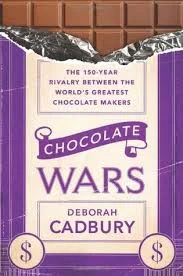CHOCOLATE WARS by Deborah Cadbury
It wasn’t easy being Quaker. Banned from careers in government, the church or law and with their pacifism barring a military career, they were forced into commerce. Their high ethical standards meant they couldn't be involved with alcohol, gambling or making armaments. The grocery trade became a natural outlet for their energies.All the great English chocolate dynasties: Cadbury, Fry and Rowntree, were Quakers. Their belief in the brotherhood of man led to paternalistic employment practices. They build garden towns for their employees with creches, sporting facilities and healthcare. Cameron's 'Big Society’ was second nature - they believed that cooperation and social provision were a necessary and natural adjunct to making money. They encouraged cooperation, volunteering and debt avoidance as fundamentals of behaviour - until competition from the State made their efforts redundant. Deborah Cadbury approvingly quotes Andrew Carnegie: "I can conceive of no greater mistake...than of trying to make charity do the work of justice." If the welfare state encourages dependency, the socially inclusive world of the chocolate industry encouraged self-reliance, hard work and abstemiousness. No pubs in Bournville and no tolerance for slackers in a tight-knit community, but generous provision for those who repaid the firm's confidence.
These straitlaced kindhearted pioneers built great chocolate empires and successfully fended off 100 years of assaults on the British market from Van Houten in Holland and Nestle, Suchard and Peter from Switzerland, while building market domination wherever the globe was coloured pink. Chocolate Wars is much more than a story of a few family businesses - it covers the worldwide growth of the now near-universal addiction to chocolate from the rather unappealing greasy chocolate drinks that prevailed at the beginning of the Victorian age. The role of innovation, war and new technology on business development are all clearly and cleverly interleaved to make this book a gripping overview of the evolution from tiny beginnings to what is now a $500 billion industry.
The book dwells in detail on the ethical dilemma faced by the early Quaker chocolatiers when they discovered that their cocoa bean supply came from plantations that relied on slave labour and tells how the Ghana cocoa industry was fostered to provide a smallholder-owned alternative. Yes there is just a fleeting mention of Fairtrade and not a word about Green & Black’s, the pioneer brand in both the organic and Fairtrade categories and a Cadbury acquisition in 2005.
One question that is unanswered in the book was "Why Switzerland?" The chocolate making season is longer at cooler heights and latitudes - chocolate doesn't set at high temperatures. Swiss watchmakers are good at precision technology. Switzerland had the first structural dairy surpluses in Europe, providing cheap milk for processors. But the fact that non-Swiss companies house their European HQ in Switzerland points to another factor: taxation. The lamentation about job losses in Bristol (which Cadbury's had already irreversibly exported to Poland) overlooked the real loss; Cadbury's annual contribution from its global activities to HM Treasury.
What triggered Cadbury's loss of independence? Selling Hershey the US rights to the Cadbury brand in 1988 meant Cadbury could never become a truly global chocolate company. When Cadbury sought to take over Rowntree and become the world's largest chocolate company the Thatcher government blocked it with a referral to the Monopolies Commission, then allowed a Nestle takeover that handed the Swiss firm global dominion. The disposal of Schweppes soft drinks in 2007 reduced debt but made the company smaller, making it just about affordable for Kraft - they still had to make a $3 billion asset disposal to fund the purchase. It may be presumptuous to disagree with my fellow Omahan, Warren Buffett, but Kraft CEO Irene Rosenfeld saw a window of opportunity and seized the moment before it could close. For that Kraft’s shareholders can be eternally grateful - she got a great deal that will amplify their fortunes going forward. The hedge funds dealt the final hand, but the vulnerability was already there and she went straight for it.











